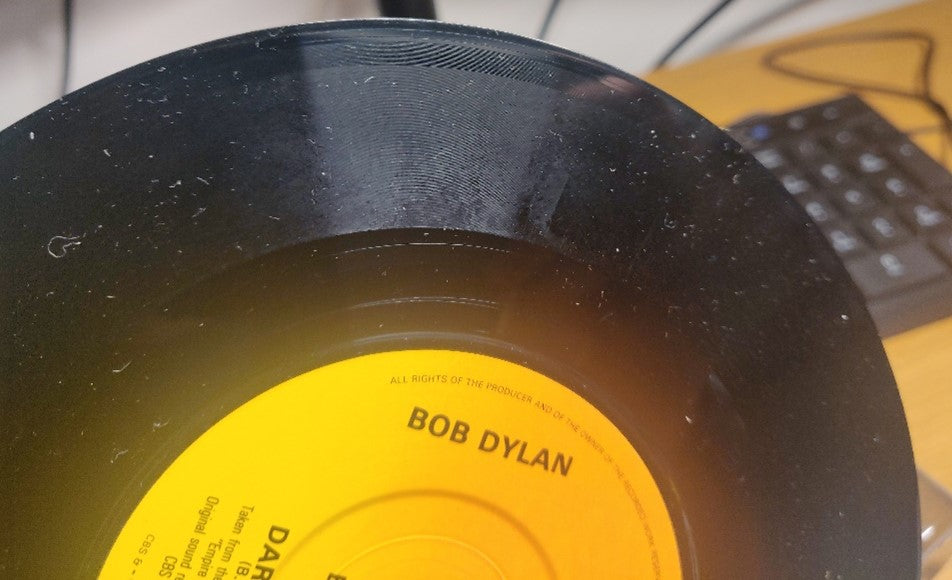For our FAQ containing all of your PVC sleeve questions, please head to the bottom of the page. We've got answers to everything, including whether paper or plastic sleeves are better, how can you tell if a record sleeve is made from PVC and how you know if your sleeves are PVC-free.
PVC Sleeves - What's Wrong With Them?
Many audiophiles nowadays will seldom use PVC sleeves to keep their vinyl collections safe, but why is that? They seem to be a perfectly clean, neat and efficient storage option. Well, that’s exactly what we will be looking at in this article.
The Sleeve Debate
Firstly, PVC (or Polyvinyl Chloride) sleeves on records is a hotly contested debate and has been for an incredibly long time. PVC sleeves have been used to keep records clean and dust-free for decades, but collectors began noticing issues, issues like hazing and misting appearing on their records’ playing surfaces, or colours on picture sleeves seeming to bleed or fade.
There are dozens of articles and videos online right now that warn against the use of PVC as a means of record storage for a plethora of reasons, and many of them can be rather detrimental.

It only takes a quick visit to sites like Discogs to see articles titled “PVC Sleeves… A WARNING”, and “Keep away from PVC bags” – these articles written by collectors who have unfortunately suffered the consequences of favouring PVC over another material like polythene (and more often than not, this decision is made completely unwittingly).
Did you know?
It transpires that PVC sleeves and regular vinyl records have one key ingredient in common… PVC. It is this same-chemical reaction coupled with heat that over time can cause damage to a record’s surface (and to the PVC sleeve as well by proxy – but I think we would all agree that the record is the thing worth trying to preserve here).


Record Care
So, for a bit of context, throughout the 1960s, 1970s and early 1980s, companies would go to great lengths to educate their audiences on how to properly maintain and store their newly purchased records. Many labels would actually include written ‘record care’ instructions on the paper inner sleeves that their records were housed in.
On these inner sleeves, it wasn’t uncommon to see advice like “keep your records away from sunlight, away from any known heat source, and upright without any additional or unnecessary weight on top of them”. It was this kind of education that sparked a generation of music lovers into finding alternative storage solutions for their collections.
So where do PVC sleeves come into the equation here? Well, it’s all to do with how PVC reacts to other materials, as well as how it fares under warmer conditions. As we mentioned before, keeping a bare record with no other outer inside a PVC sleeve will cause hazing and distortion quickly as a result of the PVC in that sleeve reacting with the materials that make up the record. This issue can often be seen with picture discs, which were often released in just a PVC sleeve.
How Does PVC Damage Records?
Even when there is an inner sleeve and a picture sleeve between the record and the PVC, higher than normal temperatures can cause the PVC sleeve’s internal plastics to distort and bleach through to the record. We have mentioned the word ‘hazing’ a few times in this article, and this is because hazing is the number one indicator that a record has suffered from PVC damage.
It's always very sad to have an exciting looking record collection come in to our office only to find that has been stored in PVC sleeves for decades. The record sleeves will often be entirely stuck to the PVC sleeves, with hazing on the records that causes a constant hissing and renders them unplayable.
PVC damage can also show itself in other forms, like mottling or other staining. The other unfortunate thing to consider here is that PVC damage cannot be removed from a record, not even with isopropyl alcohol.
What Else Can I Use?
The solution? Polythene.
Polythene is still a plastic based product, however, does not react nearly as harshly to warmer conditions when compared to PVC. For one reason or another, PVC sleeves still remain on various websites as viable and effective means of storing your records – the reality is that this simply is not true. So, if you are looking for something to keep your collection safe, look towards polythene.
You can browse our archival quality Polythene record sleeves here.
What About Paper Sleeves?
If you are looking for a more environmentally sound solution, paper (or indeed card) might be the way to go. Paper and card sleeve options are more common with 7” records due to their size, but can still be incredibly effective at keeping dust and debris away from your playing surfaces. There are two main risks involved with paper, however. Firstly, it is absorbent and can therefore hold moisture which can turn into mould on your records. Secondly, it also creates a certain amount of its own dust. If this is what you go for, we'd advise anti-static lined paper sleeves.
The truth is, as records continue to make a comeback in this technology-based world we live in, there will always be more and more methods of storing and maintaining your records. So, whether you are new to collecting or have been doing so for years – do your records a favour and stay away from PVC.
Your Questions Answered
Are paper or plastic vinyl sleeves better?
Paper is better than PVC, but polythene is better than paper. Paper releases its own dust, which can cause damage to records. Some paper sleeves contain dyes, which could also damage records. Paper will also retain moisture, which can cause mould to form on your collection. If you go for paper sleeves, you should get ones that have an anti-static plastic lining.
Are PVC outer sleeves bad for records?
YES!
Do plastic sleeves damage vinyl records?
Only PVC sleeves are at risk of causing damage to your records.
How can you tell if vinyl sleeves are PVC?
PVC sleeves are thicker and hard. You can actually tear them, like paper. They will also usually have quite a thick seam on the edges, you'll be able to see where the pieces have been stitched together.
How do I know if my sleeves are PVC free?
The easiest thing to do is to check what is written on the packaging or get in touch with whoever you bought them from. If you bought them a long time ago, it might be worth investing in some new ones so that you can be 100% certain of their ingredients. All sleeves degrade over time, so for the best protection for your collection, it's worth being sure of their quality and condition.
Is PVC safe for vinyl records?
No! If you only use it for a short time and the records are never exposed to warmer temperatures, it should be fine. But it just isn't worth the risk.
Should you buy plastic sleeves for vinyl records?
If you want to protect your records and their sleeves from dust, light, and any other dangers - yes. Polythene sleeves are a brilliant tool for protecting your collection. Shop Polythene sleeves from Atlas Records.
What sleeves are best for vinyl?
We would always recommend polythene outer sleeves. They are soft, don't cause damage to records and often also include 'UV inhibitors' just in case your collection does get exposed to any sunlight.













5 comments
Oh indeed. I have a few very precious singles that I put in PVC sleeves in the 80s…..an unreleased Sandy Denny single, for instance; looked back at it last year when I was upgrading my record storage and there it was, like a mist, matt patches where it should have been glossy, showing where the wrinkles were in its paper sleeve, fine where the paper was in actual contact with the disc……..and unlistenable through the hiss. And this had been in my bedroom, not a huge temperature range. HMV are still selling this rubbish over the counter to the unsuspected; criminal !!
If a picture disc came in PVC, and that cover is part of the item, eg has sticker on it, or embossed, or like One Vision has a red colour that changes the cover inside, what to do?
Is it safe if one puts the record in a poly sleeve, which is inside the main sleeve, which is inside an external poly sleeve, and then put all of that into the PVC cover?
Might that affect the records it’s stored next to?
It would seem the only PVC-free solution is to store those parts of the covers in a separate location and only combine them again for purposes of resale…
Interested on an article on how to manage PVC that’s part of the product, rather than just a chosen storage medium.
BTW: bought something from you recently and it came amazingly well packaged and with a nice note, so thanks again for great service!
Atlas Records, thank you so much for this post!!! I’ve been collecting records for almost 3 years and had the most tragic turn of events this week.
First, I bought a used copy of Whitney Houston’s first album from my favorite local
record store here in Dallas. It came in a plastic sleeve and at the time I hated the cheap looking plastic sleeve but didn’t do anything about it. I bought it in September and only played it twice. I played it last night and the record sounds awful. Literally, every song skips and only plays certain parts. Then today, I played Mya’s first album which I bought in Tokyo, Japan and the same thing with Side One. Although Side Two plays perfectly.
So I gooled “why do plastic sleeves ruin records” and found this post. Not only will I never buy a record that comes in plastic sleeve but I’ll be sure to let everyone I know to follow suit. I never really took record store and maintainance seriously until two of my favorite albums got ruined. Especially the Mya album, it’s impossible to find that album on vinyl. Sorry for the long comment but I’m venting. 🥹😭
Hi Kevi, thanks for your question. The lack of damage is likely that your records have been stored in a very stable environment. They won’t have been exposed to too much heat, nor rapid/extreme changes in temperature. I would also guess that you haven’t stored the records too tightly together. It is PVC sleeves in combination with extreme temperature changes and being stored too tightly (nowhere for the gas to escape to) that winds up in damage to records. Yes, PVC can damage any type of paper or card sleeve, and can also damage records through the outer sleeve. I hope this was useful, I’ll send this response to you directly too.
I have been collecting Queen vinyl since the early 80s and have pic discs in PVC sleeves from this era with no ill effects, why is this so? Is it to do with how the vinyls are pressed?
Also, can PVC sleeves affect the paper pic sleeves (7 inch) and card sleeves (12 inch) and/or the vinyl through the outer sleeve? Again I have 100s stored in PVC sleeves with no visible effects